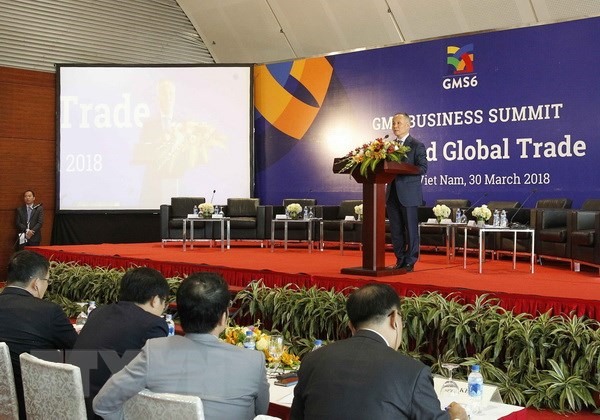Greater Mekong Subregion (GMS) countries must invest in human capital to take advantage of the opportunities that the fourth industrial revolution (Industry 4.0) brings, said panelists at a discussion on GMS and Global Trade during the Greater Mekong Sub-region (GMS-6) and the 10th Cambodia-Laos-Viet Nam Development Triangle Summit (CLV-10) on March 30 in Ha Noi.

Greater Mekong Subregion (GMS) countries must invest in human capital to take advantage of the opportunities that the fourth industrial revolution (Industry 4.0) brings, said panelists at a discussion on GMS and Global Trade during the Greater Mekong Sub-region (GMS-6) and the 10th Cambodia-Laos-Viet Nam Development Triangle Summit (CLV-10) on March 30 in Ha Noi.
Experts and panelists agreed that GMS countries’ advantage is slipping away as labour costs in the region have been climbing in recent years, coupled with the recent rise of economic nationalism and protectionism.
A growing number of companies are also moving their production bases out of GMS nations back to their countries or to different regions.
They also pointed out that in a world where technology is moving at an incredibly fast pace the challenge is not unique to the region. Even in developed countries, workers are facing increased competition from automation and robotic technology.
However, the age of technological advancement also presents GMS countries with opportunities.
For example, recent industry reports have indicated that Viet Nam has been establishing itself as a leading country in the development and proliferation of blockchain technology, the driving force behind the global phenomenon cryptocurrencies.
Panelists pointed out that previous industrial revolutions have had much longer intervals (about 100 years apart) and the world only needs around 40 years to move to Industry 4.0, all thanks to how fast technology is moving forward. This will help level the playing field and allow less developed countries to catch up quickly, if they make good use of the benefits of modern technologies.
In the technological age, the most valuable and sought-after resources are human resources and therefore, policymakers and businesses of the region must build human capital and attract talents from around the globe.
Panelists said while the region enjoys advantages such as its total population of more than 500 million people and some of the fastest growing economies in the world, it is important to look beyond the region and forge more trade ties with the rest of the world. They also urged countries to support free trade and international commerce.
During a speech at the discussion, Deputy Minister of Industry and Trade Tran Quoc Khanh underlined the huge opportunities for the GMS to forge economic links with China and India through economic corridors and free trade agreements signed between the Association of Southeast Asian Nations (ASEAN) and China and India.
It is also possible to connect the GMS Economic Cooperation Programme with other regional co-operation structures such as ASEAN, Mekong-Japan Cooperation, Mekong-Ganga Cooperation and the Belt and Road Initiative in addition to joining regional and global value chains, especially in fields of their strengths such as garment-textile, footwear, agriculture, seafood and tourism.
Khanh, however, pointed to challenges posed to GMS countries such as few co-operation projects in cross-border trade and e-commerce regulations, as well as difficulties standardising regulations to make cross-border trade easier.
He called on GMS nations to continue promoting open trade, upgrading border gates, simplifying customs procedures and enhancing ties between border management agencies. — VNS





